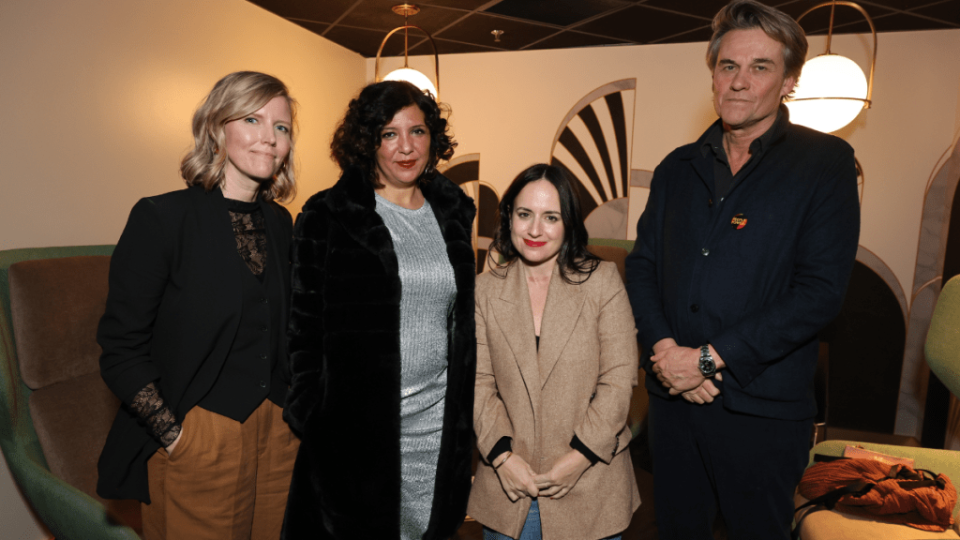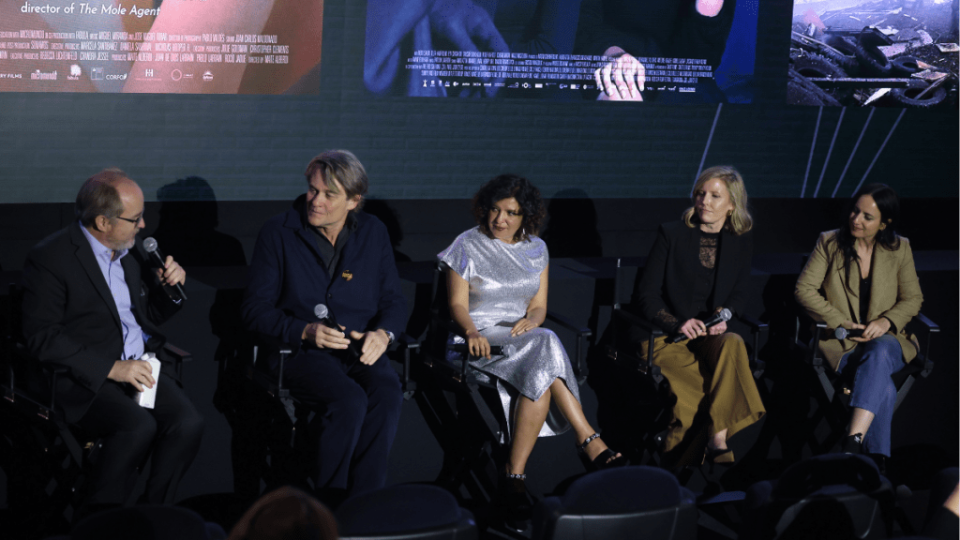TheWrap Screening Series: Best Documentary Feature Oscar Nominees on ‘Maze of Different Techniques’ in Nonfiction Storytelling | Video
The human experience – and especially how artists portray it in honest, challenging ways – was discussed by all the exceptional filmmakers nominated for the Best Documentary Feature Oscar at TheWrap’s screening showcase panel on Monday night in Los Angeles.
The artisans behind four of the Best Documentary Feature Oscar nominees were joined by TheWrap’s awards editor Steve Pond, who hosted a mutually admiring conversation between director Christopher Sharp (“Bobi Wine: The People’s President”), director Kaouther Ben Hania (“Four Daughters”), producer and editor Michelle Mizner (“20 Days in Mariupol”) and Maite Alberdi (“The Eternal Memory”). The category’s other nominee, director Nisha Pahuja (“To Kill a Tiger”), was unavailable to participate.
In a rare occurrence for this Oscar category, all five pictures are international films and take place in locations as varied as Uganda, Argentina, Tunisia, India and Ukraine. And as pointed out in the conversation, the adventurous movies offered “a maze of different techniques to tell a story,” as the moderator Pond noted.

Mizner added, “I just want to remark also on the unique and special approach of every single film that we are honored to be nominated alongside. Hearing you guys talk about them has reminded me once again of how documentaries can be so many things. And so it’s really special to be here talking about them with you.”
To that point, each filmmaker further elaborated on the mix of motivations that he or she employed in creating these films.
Christopher Sharp, who codirected “Bobi Wine: The People’s President” with Moses Bwayo, chronicled the rise of Wine, the charismatic opposition leader in Uganda, who has survived arrests, detention and assassination attempts in his effort to displace decades-long president Yoweri Museveni.
The director said that the film’s existence, in a way, is a proof of life. “The whole thing about Bobi is he just won’t stop and he’s now got it into his head that he’s going to liberate this country,” said Sharp. “(The documentary) makes him much safer. I think they kind of missed the moment to kill him and I think they realize that it’s very difficult to kill him now.” Though he added that the government’s “campaign of terror” will still “try to control the population with fear.”

A similar fear permeates Kaouther Ben Hania’s “Four Daughters,” the story of a mother in Tunisia whose two daughters were radicalized as teenagers and joined the Islamic State in Libya. In a bold flourish, Ben Hania mixed fictional scenes of actresses performing as the daughters with pure documentary footage.
“It was my main obsession to make a complex movie without making a confusing movie because I don’t want to lose the audience,” said Ben Hania, the first Arab woman nominated twice at the Oscars. Her 2018 narrative film “The Man Who Sold His Skin” was cited in the international film category.
“My main idea was to create something like Brechtian theater where we are summoning past memories with the actor. The real characters are directing the actors, so they can bring their memory to the present and then go out of the scene and think about and analyze those memories in an introspective journey to understand the origin of this tragedy of what happened to these girls.”
The pain of loss is also expressed deeply by Chilean director Maite Alberdi, receiving her second documentary Oscar nomination for “The Eternal Memory” after 2020’s “The Mole Agent.” In this case, she takes a poetic approach to documenting the relationship between actress Paulina Urrutia and her beloved husband, writer Augusto Góngora, who is suffering from Alzheimer’s.
“I thought of the Alzheimer’s as a challenge, not a tragedy,” she said. “I am attracted to stories about fragility. In general, we are not used to showing our own fragility and embracing it and understanding that it’s part of life. And one of my goals as a filmmaker is to understand that illness and fragility is a part of life and show it, but not in a dramatic way.”
Referring to her fellow documentarians on stage, Alberti added, “All of us work in a genre that does not have another categories. When you make fiction, you’re forced to say like, ‘OK, it’s a thriller, it’s a comedy, it’s a drama.’ In a documentary, you can have everything. So if you see ‘The Eternal Memory’ or ‘The Mole Agent,’ (they are also about) people having fun, people laughing, people crying. All the emotions coexist because categories do not exist in lives. And that is what I want to show.”
Michelle Mizner, who produced and edited photojournalist Mstyslav Chernov’s Ukraine-set “20 Days in Mariupol,” explained that portraying the accurate truth of the events was most crucial for the filmmaking team. Especially given the media blackout in Mariupol. The documentary is compiled of war zone footage from Russia’s invasion of the besieged city in 2022.
“We do have a lot of editorial constraints and guidelines that we do have to follow,” she said. “And they can feel very restrictive sometimes, but ultimately are in the best interest of the journalism and the efficacy and authenticity of the film and the power that it can have as a document as a record of its time.”
She added, “I feel lucky that (the photojournalists) were there to capture it in real time, because these are potential war crimes that are quickly erased. And so people are still living in the city of Mariupol, under Russian occupation. But because we have footage of what happened in real time on the ground, we’ll be able to always know what really took place.”
Watch the full screening Q&A with the filmmakers here.
The post TheWrap Screening Series: Best Documentary Feature Oscar Nominees on ‘Maze of Different Techniques’ in Nonfiction Storytelling | Video appeared first on TheWrap.

